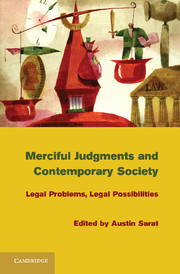Book contents
- Frontmatter
- Contents
- Acknowledgments
- Contributors
- When Can or Should Legal Judgment Be Merciful? An Introduction
- 1 The Place of Mercy in Legal Discourse
- Commentary on Chapter 1
- 2 Mercy, Crime Control, and Moral Credibility
- Commentary on Chapter 2
- 3 Defending a Role for Mercy in a Criminal Justice System
- Commentary on Chapter 3
- 4 Actions of Mercy
- Commentary on Chapter 4
- 5 A Feminist View of Mercy, Judgment, and the “Exception” in the Context of Transitional Justice
- Commentary on Chapter 5
- Index
- References
When Can or Should Legal Judgment Be Merciful? An Introduction
Published online by Cambridge University Press: 05 December 2011
- Frontmatter
- Contents
- Acknowledgments
- Contributors
- When Can or Should Legal Judgment Be Merciful? An Introduction
- 1 The Place of Mercy in Legal Discourse
- Commentary on Chapter 1
- 2 Mercy, Crime Control, and Moral Credibility
- Commentary on Chapter 2
- 3 Defending a Role for Mercy in a Criminal Justice System
- Commentary on Chapter 3
- 4 Actions of Mercy
- Commentary on Chapter 4
- 5 A Feminist View of Mercy, Judgment, and the “Exception” in the Context of Transitional Justice
- Commentary on Chapter 5
- Index
- References
Summary
Mercy occupies an uncomfortable position in liberal legal systems like that of the United States. From everyday encounters between citizens and police to grand gestures like executive pardons, the possibilities and need for mercy and merciful judgments abound. Law needs mercy. Thus, for theorists like Martha Nussbaum mercy can and should be folded seamlessly into the operations of law.
Yet almost as ubiquitous as are occasions for the exercise of mercy are suspicions and doubts about it. Low-visibility police decisions, prosecutorial charging decisions, judicial sentencing in the absence of guidelines – these and other merciful judgments often seem troublingly arbitrary, prone to partiality or outright discrimination. As Jeffrie Murphy puts it:
If we simply use the term “mercy” to refer to certain of the demands of justice (e.g. the demand for individuation), then mercy ceases to be an autonomous virtue and instead becomes part of…justice. It thus becomes obligatory, and all the talk about gifts, acts of grace, supererogation, and compassion becomes quite beside the point. If, on the other hand, mercy is totally different from justice and actually requires (or permits) that justice sometimes be set aside, it then counsels injustice. In short, mercy is either a vice (injustice) or redundant part of justice.
- Type
- Chapter
- Information
- Merciful Judgments and Contemporary SocietyLegal Problems, Legal Possibilities, pp. 1 - 18Publisher: Cambridge University PressPrint publication year: 2011



